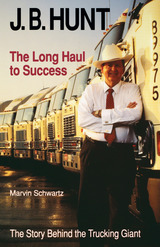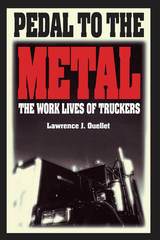3 books about Trucking

Braking the Special Interests
Trucking Deregulation and the Politics of Policy Reform
Dorothy Robyn
University of Chicago Press, 1987
In 1980 Congress voted to eliminate the federal system of protective regulation over the powerful trucking industry, despite fierce opposition. This upset marked a rare example in American politics of diffuse public interests winning out over powerful economic lobbies. In Braking the Special Interests Dorothy Robyn draws upon firsthand observations of formal proceedings and behind-the-scenes maneuverings to illuminate the role of political strategy in the landmark trucking battle.
Robyn focuses her analysis on four elements of strategy responsible for the deregulator's victory—elements that are essential, she argues, to any successful policy battle against entrenched special interests: the effective use of economic data and analysis to make a strong case for the merits of reform; the formation and management of a diverse lobbying coalition of firms and interest groups; presidential bargaining to gain political leverage; and transition schemes to reduce uncertainty and cushion the blow to losers.
Drawing on political and economic theory, Braking the Special Interests is an immensely rich and readable study of political strategy and skill, with general insights relevant to current political battles surrounding trade, agriculture, and tax policies. Robyn's interdisciplinary work will be of great value to scholars and practitioners of politics, economics, and public policy.
Robyn focuses her analysis on four elements of strategy responsible for the deregulator's victory—elements that are essential, she argues, to any successful policy battle against entrenched special interests: the effective use of economic data and analysis to make a strong case for the merits of reform; the formation and management of a diverse lobbying coalition of firms and interest groups; presidential bargaining to gain political leverage; and transition schemes to reduce uncertainty and cushion the blow to losers.
Drawing on political and economic theory, Braking the Special Interests is an immensely rich and readable study of political strategy and skill, with general insights relevant to current political battles surrounding trade, agriculture, and tax policies. Robyn's interdisciplinary work will be of great value to scholars and practitioners of politics, economics, and public policy.
[more]

J. B. Hunt
The Long Haul to Success
Marvin Schwartz
University of Arkansas Press, 1992
In J. B. Hunt: The Long Haul to Success, Marvin Schwartz chronicles the remarkable achievements of Johnnie Bryan Hunt, a man who, in Schwartz’s words, “embodies the American rags-to-riches fable in its most engaging personification.” Hunt’s corporate strategies, entrepreneurism, and spiritual convictions come to light in this account of a small Arkansas business that grew to become the largest trucking company in the nation.
[more]

Pedal To The Metal
The Work Life of Truckers
Lawrence J. Ouellet
Temple University Press, 1994
From this experience, Lawrence J. Ouellet has the advantage of a rare perspective and a profound understanding of the two fundamental questions he asks in this book: Why do truck drivers work so hard even when it doesn't result in more money or other material gains? and How do truckers make sense of their behavior to themselves and to the outside world?
A vivid ethnography of trucking culture, Pedal to the Metal documents and analyzes truckers' lives and work ethic, exploring the range of identities truckers create for themselves—the renegade cowboy, the company man, the voyeur, the lone king of the road. To explain truckers' motivations, Ouellet examines the meaning of work and the motivation for excelling despite long, unsupervised hours on the road. He finds that their occupational pride results in extraordinary efforts on the job and, subsequently, a positive sense of self. Driving skill allows truckers to improve their hauling times, which they proudly track to the minute, and to increase their productivity and income.
Truckers' knowledge of the industry's structure and the idiosyncrasies of their own company allows them to improve their ability to get and carry out assignments, to maneuver around a traditional concept of rank and seniority, and to recreate to their advantage the pervasive cultural myths that the public expects should dictate a trucker's behavior. Whether capturing the pleasure and enchantment of trucking—driving under moon-lit skies across a snow-covered mountain range—or the miseries of boredom, bad weather, and exhausting schedules, Ouellet exhibits deep appreciation and passion for his subject.
[more]
READERS
Browse our collection.
PUBLISHERS
See BiblioVault's publisher services.
STUDENT SERVICES
Files for college accessibility offices.
UChicago Accessibility Resources
home | accessibility | search | about | contact us
BiblioVault ® 2001 - 2024
The University of Chicago Press









